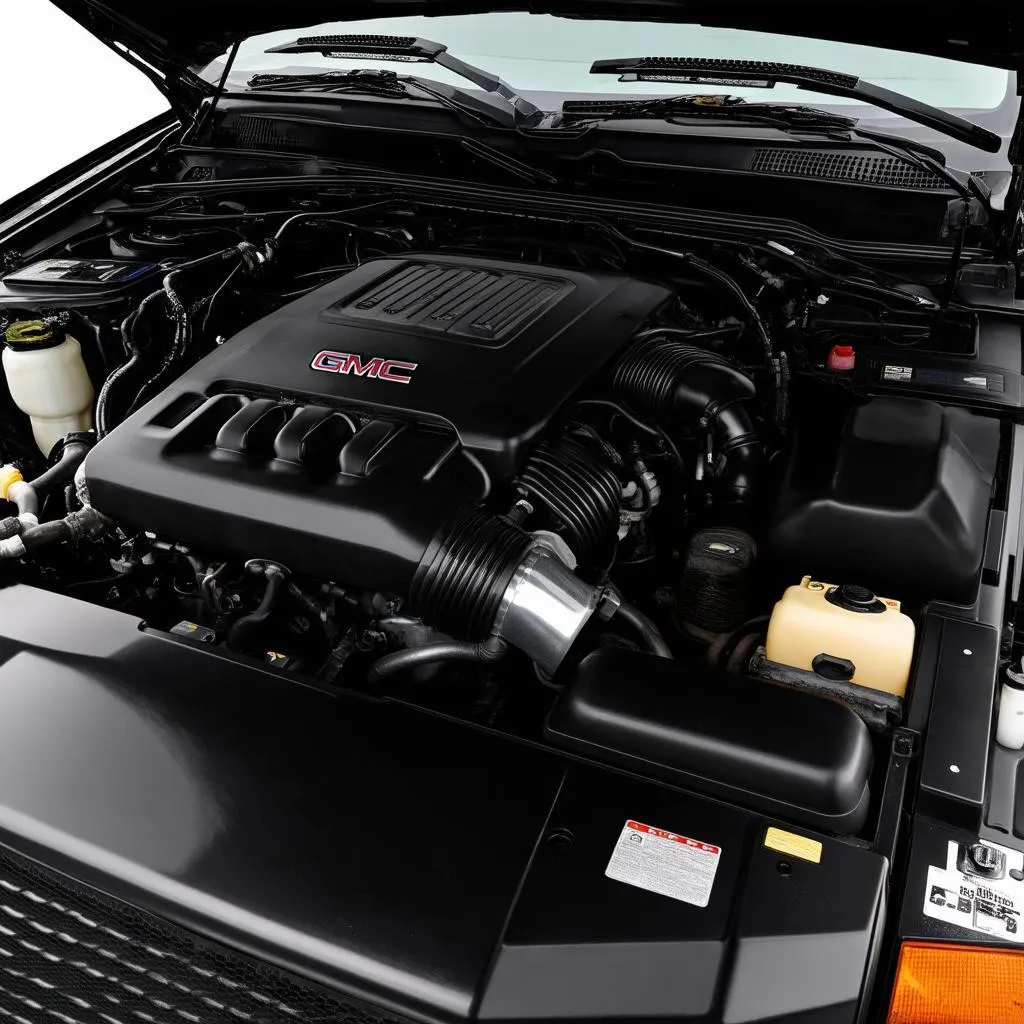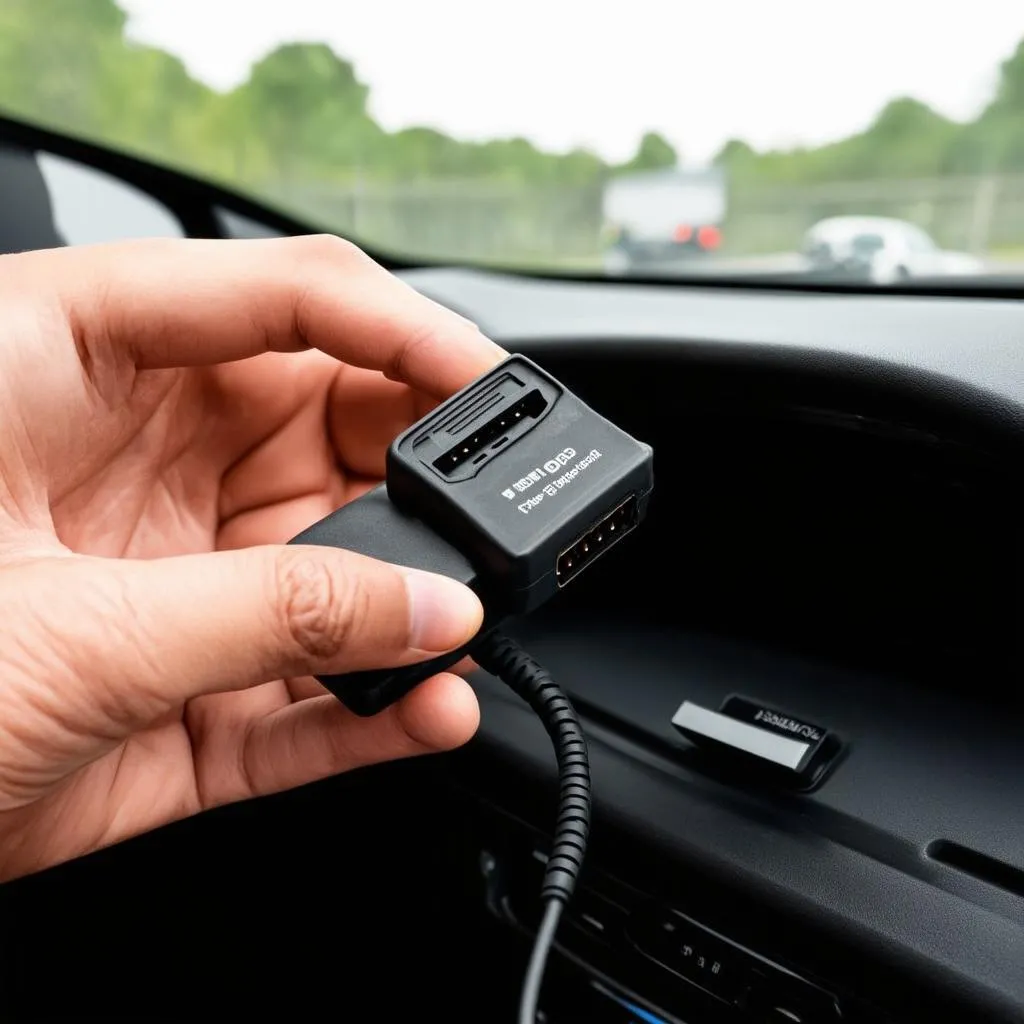Have you ever been cruising down the road in your trusty 2005 GMC Sierra or Yukon, powered by that robust 5.3L engine, when suddenly the check engine light throws a wrench in your plans? You hook up your trusty OBD scanner, only to be greeted by the cryptic code “P0171”? Don’t worry, you’re not alone. This is a common issue for many GMC owners, and understanding what it means, why it happens, and how to fix it can save you a lot of headache (and money!).
What Does P0171 Really Mean?
In simple terms, a P0171 code means your engine’s computer has detected a “lean” condition in the air-fuel mixture for Bank 1. Think of it like this: your engine needs the perfect balance of air and fuel to run smoothly, like a well-tuned orchestra. Too much air (a lean condition) and the performance suffers, just like an orchestra missing a few key instruments.
The Importance of the Right Balance
Maintaining the right air-fuel ratio is crucial for optimal engine performance, fuel efficiency, and emissions control. When the mixture is off, even slightly, it can trigger a cascade of issues.
Unraveling the Causes of P0171 on Your GMC 5.3L
Several culprits could be contributing to the P0171 code in your 2005 GMC 5.3L engine. Let’s investigate some of the usual suspects:
- Vacuum Leaks: A leak in the intake manifold or vacuum hoses is like a sneakily opened window in your house – it disrupts the carefully controlled environment. Air bypasses the mass airflow sensor (MAF), causing the engine to receive an incorrect reading and miscalculate the fuel needed.
- Faulty Oxygen Sensor (O2 Sensor): The O2 sensor acts as the engine’s “nose,” constantly sniffing the exhaust gases to determine the air-fuel ratio and sending feedback to the engine control unit (ECU). A malfunctioning O2 sensor can send inaccurate signals, leading to a false lean condition detection.
- Dirty or Failing MAF Sensor: Just like a dusty air filter, a dirty or faulty MAF sensor can’t accurately measure the incoming airflow. This inaccurate reading confuses the ECU, resulting in an improper air-fuel mixture.
- Fuel System Problems: A weak fuel pump, clogged fuel filter, or malfunctioning fuel injectors can starve your engine of the fuel it needs, leading to a lean condition.
Don’t Forget the Simple Stuff!
Before diving into complex repairs, it’s worth checking the easy things first. A loose gas cap, for example, can actually trigger a lean code. Always inspect the basics before moving on to more complicated diagnostics.
 GMC Sierra engine
GMC Sierra engine
Troubleshooting P0171: A Step-by-Step Approach
Now that we understand the possible causes, let’s look at how to diagnose and fix the P0171 code:
- Visual Inspection: Begin by visually inspecting the vacuum hoses, intake manifold gasket, and air intake for any cracks, loose connections, or damage.
- Check for Vacuum Leaks: Use a carburetor cleaner or brake cleaner to spray around suspected leak areas while the engine is running. If the engine speed changes, you’ve likely found a leak.
- Inspect the MAF Sensor: Carefully remove the MAF sensor and clean it with a specialized MAF sensor cleaner.
- Test the O2 Sensor: An OBD scanner with live data capabilities can help monitor the O2 sensor readings to determine if it’s functioning correctly.
- Fuel System Check: Check the fuel pressure with a fuel pressure gauge to ensure the fuel pump delivers adequate pressure. Inspect and replace the fuel filter if necessary.
When in Doubt, Seek Professional Help
While DIY repairs can be satisfying, sometimes it’s best to leave it to the professionals. If you’re not comfortable tackling these diagnostics yourself, a trusted mechanic with experience in GM vehicles and dealer-level scan tools can quickly pinpoint and resolve the issue.
P0171 and Your Engine’s “Chi”: A Holistic Perspective
From a holistic standpoint, maintaining your vehicle’s health is akin to ensuring good “chi” or energy flow. Just as imbalances in our bodies can lead to discomfort, neglecting your engine’s needs can disrupt its harmonious operation. Regularly scheduled maintenance and addressing issues promptly contribute to a smooth-running and long-lasting engine.
Frequently Asked Questions:
- Can I still drive my truck with a P0171 code? While you might not experience immediate drivability problems, driving with a lean condition for extended periods can lead to engine damage. It’s best to address the issue as soon as possible.
- Is a P0171 code expensive to fix? The cost can vary greatly depending on the underlying cause. A simple vacuum leak repair could be relatively inexpensive, while a faulty fuel pump replacement can be more costly.
- Can a bad gas cap really cause a P0171 code? Yes, a loose or damaged gas cap can allow fuel vapors to escape, disrupting the fuel system’s pressure and potentially triggering a lean code.
 OBD Scanner plugged into a car's OBD-II port
OBD Scanner plugged into a car's OBD-II port
Related Questions:
- What are the symptoms of a bad MAF sensor?
- How to test a fuel pressure regulator on a GMC 5.3L engine?
- What is the difference between a P0171 and P0174 code?
Compatible Vehicle Makes for Dealer-Level Diagnostics:
Our specialized dealer scanner tools are compatible with a wide range of European car brands, including:
- Audi
- BMW
- Mercedes-Benz
- Volkswagen
- Volvo
- Porsche
Need Help Diagnosing Your Car Troubles?
Contact us via Whatsapp at +84767531508 for expert assistance with diagnostic tools and car repair advice. Our team of automotive specialists is available 24/7 to help you get back on the road quickly and safely.
Keep Your GMC 5.3L Humming
A P0171 code doesn’t have to be a major setback. By understanding what it means, the potential causes, and how to diagnose the problem, you can address the issue promptly and keep your 2005 GMC 5.3L engine running smoothly for miles to come. Remember, a little preventative maintenance and a proactive approach go a long way in ensuring your vehicle’s longevity and your peace of mind.
For more helpful tips and insights on car maintenance and repair, explore our other informative articles at techcarusa.com.
